Coordination
Background
Effective coordination can prevent gaps and overlaps in humanitarian responses, ensure the impact of CVA is optimised for the benefit of crisis affected populations, whilst also making the most of limited humanitarian funding. But the CALP Network’s State of the World’s Cash report found that cash coordination is seen as weak and ad hoc, and that this is having serious operational impact.
Ninety-five donors, international and national NGOs, private sector actors and one UN agency have called for clarity on two key issues surrounding cash coordination:
- Who should be accountable for ensuring effective cash coordination, and
- What the scope of Cash Working Groups should be, including in relation to multipurpose cash.
We urgently need to build on what works and provide clarity at the global level on the questions above, whilst adapting to different contexts. Clear decisions based on the impact on affected populations rather than agency politics are long overdue.
Current priorities
We aim to contribute to progress on this issue on three levels: supporting Cash Working Groups at the regional level; contributing to practical solutions for cash coordination at the global level; and convening evidence-based discussion on the key issues, highlighting critical decision points and opportunities for progress.
Featured content

Cash Coordination – LIVE timeline
Page
The latest updates on cash coordination as they unfold.

95 Organisations Sign Letter Calling for Strengthened Cash Coordination
News
Today a letter signed by 95 organisations was handed into the Emergency Relief Coordinator (ERC) urging the Inter-Agency Standing Committee (IASC) to take a decision on the leadership and scope of cash coordination in the coming year.

Is cash transforming the humanitarian system or is the system limiting how cash is used?
Blog Post
At the State of World’s Cash 2020 launch event, Sorcha O’Callaghan, Director of Humanitarian Policy Group at ODI warned that, “Cash offers a huge transformative potential, but as far as the system is privileging the interest of the agencies over people in crisis, we won’t be able to see it”. If you missed the State of the World's Cash 2020 launch we're sharing highlights. Quote 4...
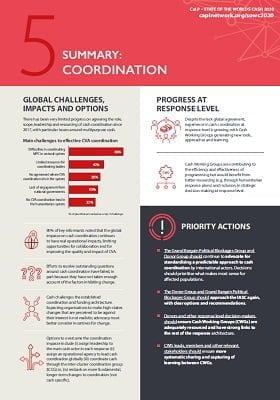
State of the World’s Cash 2020 Chapter 5 summary: Coordination
Report
There has been very limited progress on cash coordination since 2017. Cash continues to challenge the established coordination and funding architecture, and efforts to resolve outstanding questions around cash coordination have failed. Despite the lack of global agreement, Cash Working Groups are pushing forward and contributing to improved programming, and generating new approaches. This...

Cash Coordination Tip Sheet
Guidelines and Tools
This tip sheet sets out established best practice, key guidance and resources for all aspects of cash coordination, intended as a clear, accessible and action-oriented guide for those engaged in coordination of cash and voucher assistance (CVA) at the field level.

Introducing the Cash Coordination Tip Sheet
Webinar
The CALP Network has developed a tipsheet setting out established best practice and key guidance and resources for all aspects of cash coordination, intended as a clear, accessible and action-oriented guide for those engaged in coordination of cash and voucher assistance at the field level.

Cash Coordination: A proposal from members in MENA
Blog Post
Earlier this year the CALP Network undertook regional consultations to explore options for cash coordination. This blog lays out recommendations from participants from the Middle East and North Africa who sketched out what cash coordination, and coordination more broadly, could look like in future to support a more effective, efficient and accountable response.
Thematic lead
Latest

The CALP Network East Africa Members Consultative Discussion
Event

Cash and Markets Working Group Strategic Workshop Report – Libya
Report
On the 6th and 7th of February 2018, a two days meeting opened to the members of the CMWG, Sector Leads, World Bank, UNSMIL, OCHA and Donors was held in Tunis to review the achievements, gaps and challenges of cash programing and articulate the 2018 humanitarian Cash Strategy for Libya. Supported by a...

Announcing: State of the World’s Cash launch event
Blog Post
Join us at ODI on 1 February 2018 for the launch of the 2018 State of the World's Cash Report. The State of the World's Cash report critically analyses the current state of CTP in humanitarian aid, and the extent to which commitments have been achieved, in order to provide shared insights that can...

Cash Week 2018: Event Report
Report
Cash Week 2018 was a series of events aimed at advancing issues, reflecting, and preparing for the future of cash and voucher assistance. The events, which took place in London and online from 15-19 October 2018, were intended to provide opportunities for: Networking and collaboration between the CALP...
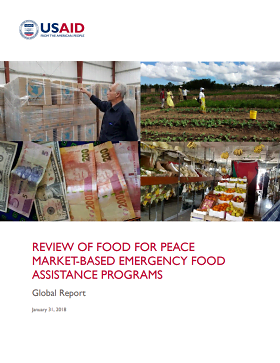
Review of Food for Peace Market-Based Emergency Food Assistance Programs Global Report
Report
Efficient and effective use of humanitarian funds is critical to meet the emergency needs of as many people as possible, especially as emergencies in developing countries have become more numerous, complex, and protracted. The United States Agency for International Development (USAID) Office of Food for...
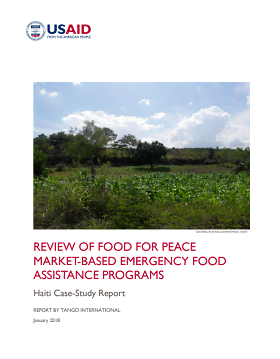
Review of Food for Peace Market-Based Emergency Food Assistance Programs: Haiti Case-Study Report
Report
Haiti is a very low-income country with a degraded ecological setting that faces repeated threats from multiple hazards. It is an excellent example of Food for Peace (FFP) linking emergency and development funding through the Kore Lavi Title II program that serves as a model for the national social...

Review of Food for Peace Market-Based Emergency Food Assistance Programs: Jordan/Turkey Case Study Report
Report
Syria regional crisis: The response to the Syria regional crisis exemplifies the challenges and opportunities involved with delivering food assistance in a widespread, largely urban refugee and internally displaced persons (IDP) crisis affecting middle-income countries. This case study focuses on...
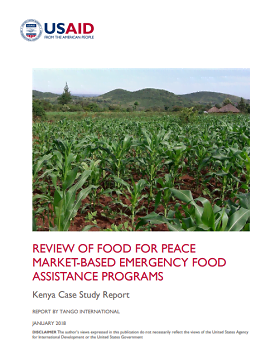
Review of Food for Peace Market-Based Emergency Food Assistance Programs: Kenya Case Study Report
Report
Kenya represents a country focused on building resilience through greater partnerships between USAID-Food for Peace (FFP) programs, other USAID-funded programs and local and national government. DESIGN: FFP MBEP in Kenya is a good example of connecting emergency and development programming and of...
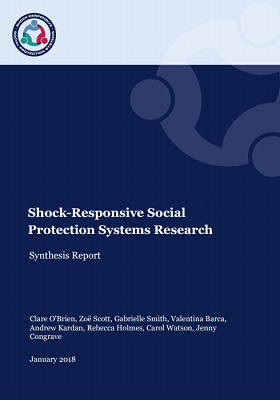
Shock Responsive Social Protection Systems Research: Synthesis Report
Report
This synthesis report consolidates the evidence and lessons learned from the research, drawing on all the case studies and other outputs, including the literature review as well as policy briefs on systems development and monitoring and evaluation. It highlights the key ways in which social protection...
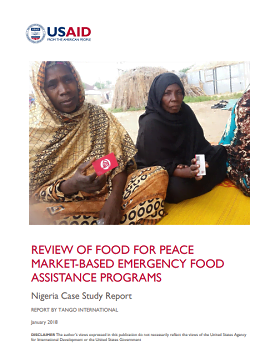
Review of Food for Peace Market-Based Emergency Food Assistance Programs: Nigeria Case Study Report
Case Study
Nigeria is an example of food assistance in a conflict situation in the Sahelian context. The response used information technology to deliver one of the more sophisticated applications of voucher programs. This case is a good example of proactive implementing partner (IP) mechanisms and monitoring systems...

Review of Food for Peace Market-Based Emergency Food Assistance Programs: Sierra Leone Case Study Report
Report
Sierra Leone represents a remarkable experiment in market-based emergency programming using unconditional cash transfers and some conditional cash transfers Sierra Leone reflects the challenges of providing food assistance in the wake of a major infectious disease epidemic. Food insecurity increased due...

Review of Food for Peace Market-Based Emergency Food Assistance Programs: Zimbabwe Case Study Report
Report
Zimbabwe reflects the recent Southern African drought crisis during a period of a regional El Niño-related drought and a national cash crisis. The United States Agency for International Development (USAID) Office of Food for Peace (FFP) funded a mix of programming between fiscal years 2011 and 2015,...
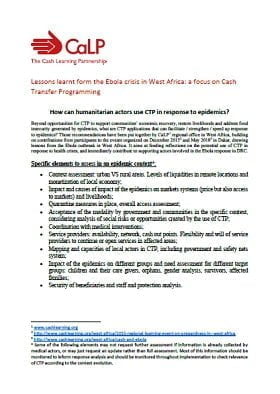
Lessons Learnt from the Ebola Crisis in West Africa: a focus on Cash Transfer Programming
Report
Beyond opportunities for CTP to support communities’ economic recovery, restore livelihoods and address food insecurity generated by epidemics, what are CTP applications that can facilitate / strengthen / speed up response to epidemics? Those recommendations have been put together by the CALP Network...

Cash Transfer Programming in Somaliland
Report
This report brings together reflections from a one-day learning event which took place in Hargeisa in March 2018. Participants reflected on what aspects of cash transfer programming worked well in the 2017 response and what needs to be improved going forward. In addition, there was a discussion about the...
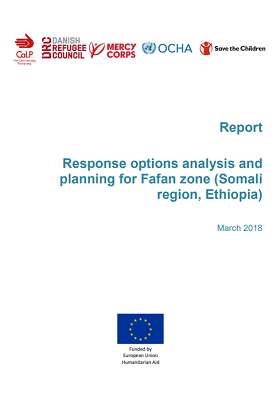
Response options analysis and planning for Fafan zone (Somali region, Ethiopia)
Guidelines and Tools
Between October 2017 and March 2018, the Consortium began the pilot in Ethiopia with the aim of providing technical and strategic support to country-based humanitarian organisations, enabling them to engage in collaborative assessments and decision making. Whilst the Consortium has not been conceived to...

CTP Operational Models Analytical Framework
Guidelines and Tools
The State of the World’s Cash Report launched by the CALP Network in February 2018 highlights trends in the uptake of various operational models for the delivery of cash at scale in humanitarian response. Current decision making on the choice between these various operational models is highly influenced...
Sudan Cash Working Group meeting minutes 12 December 2017
Report
Sudan Cash Working Group meeting minutes 12 December 2017

Inter-Agency Joint Cash Study: Market Functionality and Community Perception of Cash Based Assistance – Yemen
Report
Since 2015, conflict in Yemen has left 3 million people displaced and over half of the population food insecure, and has destroyed much of the country’s infrastructure. As of July 2017, much of the population had lost their primary source of income, 46% lacked access to a free improved water source and...

The CALP Network’s Cash Learning Hub is Now Live!
Blog Post
The Cash Learning Hub is a one-stop-shop for Cash Transfer Programming (CTP) learning and training resources, and our course catalogue has over 30 resources in English, French Arabic, and Spanish. By partnering with the Humanitarian Leadership Academy, the CALP Network is able to bring its course...

Global Framework for Action
Guidelines and Tools
This framework provides a consolidated summary of the major commitments and recommendations made to improve cash transfer programming in humanitarian response during 2015 and 2016. It aggregates the core content of: the Grand Bargain, ECHO’s 10 Principles, the High Level Panel report, the Strategic Note...
